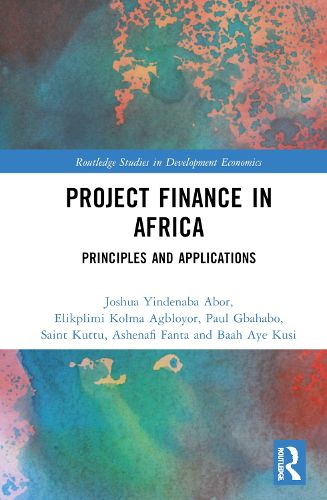Readings Newsletter
Become a Readings Member to make your shopping experience even easier.
Sign in or sign up for free!
You’re not far away from qualifying for FREE standard shipping within Australia
You’ve qualified for FREE standard shipping within Australia
The cart is loading…






Infrastructure drives economic growth and sustainable development by facilitating productivity, attracting foreign investment, promoting industrialisation, reducing poverty, improving standards of living, and enhancing human development. Thus, the development of project-oriented frameworks/institutions that offer long-term infrastructure financing has been identified as a core and guaranteed way to maximise economic growth and development, especially for developing regions like Africa. Project finance has a critical role in infrastructure development. This book examines the project finance ecosystem, methods, analysis, and key-related risks. Its unique contribution to the literature is its focus on Africa, where there is a huge infrastructure investment deficit and a lack of technical know-how to bridge this gap. Following a detailed introduction to project finance, the book investigates project viability, project characteristics, risk analysis and management, structure and legal issues in the context of project finance, as well as project finance markets, banks and syndicated lending, financing the deal, and the role of project advisors. It also offers insight into financial modelling and project evaluation, credit risk in project finance from the lender's perspective, and the role of project finance in the petroleum industry. The book provides two African-related case studies of project finance. The book incorporates theoretical perspectives, valuable policy insights and resources, and offers strategies to improve and reform the structure and implementation of project finance in Africa. It provides scholarly and professionally engineered knowledge, and while each chapter explains and discusses several related issues, the case studies offer a real-life learning and teaching experience for academics and students to enhance their understanding of the issues under discussion.
$9.00 standard shipping within Australia
FREE standard shipping within Australia for orders over $100.00
Express & International shipping calculated at checkout
Infrastructure drives economic growth and sustainable development by facilitating productivity, attracting foreign investment, promoting industrialisation, reducing poverty, improving standards of living, and enhancing human development. Thus, the development of project-oriented frameworks/institutions that offer long-term infrastructure financing has been identified as a core and guaranteed way to maximise economic growth and development, especially for developing regions like Africa. Project finance has a critical role in infrastructure development. This book examines the project finance ecosystem, methods, analysis, and key-related risks. Its unique contribution to the literature is its focus on Africa, where there is a huge infrastructure investment deficit and a lack of technical know-how to bridge this gap. Following a detailed introduction to project finance, the book investigates project viability, project characteristics, risk analysis and management, structure and legal issues in the context of project finance, as well as project finance markets, banks and syndicated lending, financing the deal, and the role of project advisors. It also offers insight into financial modelling and project evaluation, credit risk in project finance from the lender's perspective, and the role of project finance in the petroleum industry. The book provides two African-related case studies of project finance. The book incorporates theoretical perspectives, valuable policy insights and resources, and offers strategies to improve and reform the structure and implementation of project finance in Africa. It provides scholarly and professionally engineered knowledge, and while each chapter explains and discusses several related issues, the case studies offer a real-life learning and teaching experience for academics and students to enhance their understanding of the issues under discussion.